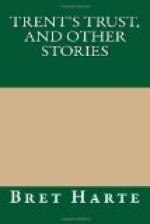“That reminds me of a little joke that happened in Sacramento last week. You remember Dick Stannard, who died a year ago—one of your friends?”
“I have yet to learn,” interrupted the colonel, with the same deadly deliberation, “what right he—or anybody—had to intimate that he held such a relationship with me. Am I to understand, sir, that he—er—publicly boasted of it?”
“Don’t know!” resumed Pyecroft hastily; “but it don’t matter, for if he wasn’t a friend it only makes the joke bigger. Well, his widow didn’t survive him long, but died in the States t’other day, leavin’ the property in Sacramento—worth about three thousand dollars—to her little girl, who is at school at Santa Clara. The question of guardianship came up, and it appears that the widow—who only knew you through her husband—had, some time before her death, mentioned your name in that connection! He! he!”
“What!” said Colonel Starbottle, starting up.
“Hold on!” said Pyecroft hilariously. “That isn’t all! Neither the executors nor the probate judge knew you from Adam, and the Sacramento bar, scenting a good joke, lay low and said nothing. Then the old fool judge said that ’as you appeared to be a lawyer, a man of mature years, and a friend of the family, you were an eminently fit person, and ought to be communicated with’—you know his hifalutin’ style. Nobody says anything. So that the next thing you’ll know you’ll get a letter from that executor asking you to look after that kid. Ha! ha! The boys said they could fancy they saw you trotting around with a ten year old girl holding on to your hand, and the Senorita Dolores or Miss Bellamont looking on! Or your being called away from a poker deal some night by the infant, singing, ’Gardy, dear gardy, come home with me now, the clock in the steeple strikes one!’ And think of that old fool judge not knowing you! Ha! ha!”
A study of Colonel Starbottle’s face during this speech would have puzzled a better physiognomist than Mr. Pyecroft. His first look of astonishment gave way to an empurpled confusion, from which a single short Silenus-like chuckle escaped, but this quickly changed again into a dull coppery indignation, and, as Pyecroft’s laugh continued, faded out into a sallow rigidity in which his murky eyes alone seemed to keep what was left of his previous high color. But what was more singular, in spite of his enforced calm, something of his habitual old-fashioned loftiness and oratorical exaltation appeared to be returning to him as he placed his hand on his inflated breast and faced Pyceroft.
“The ignorance of the executor of Mrs. Stannard and the—er—probate judge,” he began slowly, “may be pardonable, Mr. Pyecroft, since his Honor would imply that, although unknown to him personally, I am at least amicus curiae in this question of—er—guardianship. But I am grieved—indeed I may say shocked—Mr. Pyecroft, that the—er—last sacred




